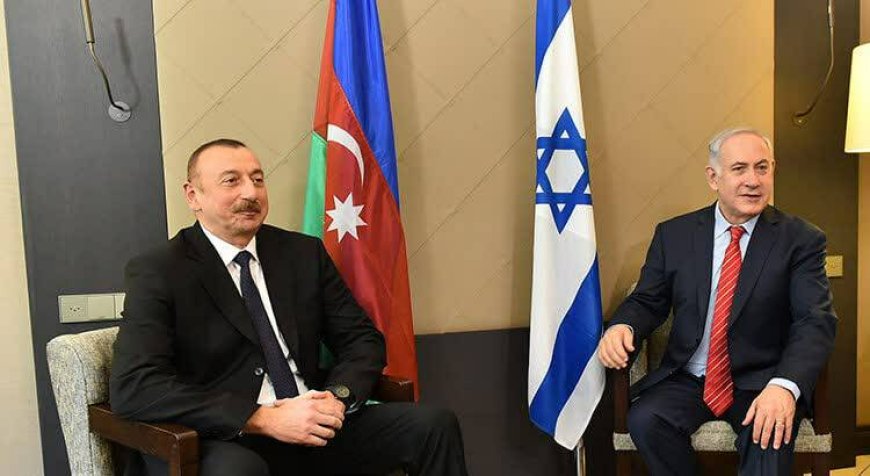Unmasking a Sinister Alliance: The Multifaceted Relationship between Israel and Azerbaijan
Unmasking a Sinister Alliance: The Multifaceted Relationship between Israel and Azerbaijan

While successful in strengthening ties with certain countries in the region, such as Kazakhstan and Azerbaijan, research indicates that the collaboration between these actors lacks several key indicators of a "strategic alliance," including exclusive relations, deep engagement, shared strategic objectives, institutionalisation, and a clear definition of common enemies, threats, and competitors. Consequently, the term "tactical cooperation" better captures the nature of the relationship between Israel and Azerbaijan as opposed to a comprehensive strategic alliance.
Over time, the Zionist regime fostered ties with Azerbaijan, which boasts the second-largest Jewish population in the South Caucasus and West Asia after Turkey. The relationship between Tel Aviv and Baku entered a new phase in recent years with the opening of the Azerbaijani Embassy in the occupied Palestinian territories. In 2022, Azerbaijan’s director of the international office of GRATA attended a meeting organised by the "Israel-Azerbaijani Chamber of Commerce and Industry" in the city of Shushi, located in the disputed Nagorno-Karabakh region. This gathering explored opportunities for collaboration between Israeli and Azerbaijani companies to revitalise the war-ravaged economy of Karabakh. Notably, a trilateral memorandum of cooperation was signed during this event, involving the "Small and Medium Business Development Agency of the Republic of Azerbaijan," the "Federation of Israeli Chambers of Commerce," and the "Israel-Azerbaijan Chamber of Commerce and Industry."
In this regard, the trade volume between Israel and Azerbaijan in the first two months of 2023 reached $334.1 million, showing a 26.36% increase compared to the same period in 2022. Israel's share of Azerbaijan's total turnover also grew by 4.66%. The Israeli ambassador in Azerbaijan, George Dick, anticipates that bilateral trade turnover will double this year.
Considering these factors, the opening of the Azerbaijani Embassy in the occupied territories on March 29, 2023, reflects the culmination of 30 years of cooperation. The visit of Israeli Foreign Minister Eli Cohen to Azerbaijan in April 2023, accompanied by a substantial economic delegation, further demonstrates the dynamic nature of the bilateral relationship.
Another significant aspect of the bilateral partnership between Tel Aviv and Baku is Azerbaijan's endeavours to establish a cyber-security centre with support from Israeli experts. The Minister of Digital Development and Transport of Azerbaijan, Rashad Nabiyev, has recently announced that this centre is being developed in collaboration with an Israeli university and is set to commence operations in the near future. The focus of the project is to address cyber security challenges for government agencies and the private sector. However, detailed information about the plan has not been disclosed.
Moreover, recent reports suggest that the Azerbaijani company Prosol has engaged Israeli experts to enhance their cyber training programmes, thereby bolstering their capabilities in this domain.
Today, Azerbaijan serves as the primary source of oil for Israel, contributing approximately 40% of its annual oil consumption. Conversely, Israel ranks as the sixth-largest importer of Azerbaijani oil. The transportation of oil to the occupied territories is facilitated through a pipeline that traverses Turkey. Additionally, a subsidiary of the Azerbaijan State Oil Company (SOCAR) is engaged in oil and gas exploration activities in the coastal areas of Israel. This particular project marks a significant milestone for SOCAR, as it represents their first venture outside the Caspian Sea and could potentially contribute to their aspirations of becoming a famous international oil company.
It is noteworthy that both Baku and Tel Aviv have adopted a cautious approach to publicly acknowledging their relationship, potentially motivated by security concerns and a desire to avoid provoking regional and international sensitivities. However, statements from Azerbaijani authorities shed light on the extensive involvement of Israeli companies in the Nagorno-Karabakh region. During the commemoration of the 75th anniversary of the establishment of the Zionist regime in Baku, the Speaker of the National Assembly of Azerbaijan highlighted the active participation of Israeli companies in the reconstruction efforts of Karabakh and Eastern Zangezur. Furthermore, Azerbaijani officials admitted that approximately 10 to 15 Israeli companies have expressed interest in participating in reconstruction projects throughout Karabakh, with applications already being submitted through the Israeli embassy. This indicates that Azerbaijan envisions perpetuating its occupation of Karabakh by granting permits for the involvement of various foreign companies, including those from the Zionist regime.












































